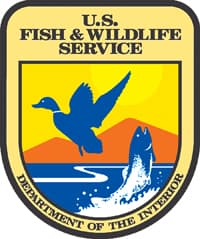U.S. Fish and Wildlife Service Biologist Receives Interior Department’s Meritorious Service Honor
OutdoorHub 01.03.13

U.S. Fish and Wildlife Service biologist Charles “Charlie” Herbert was awarded the Department of the Interior’s Meritorious Service Award on Wednesday, just before announcing his retirement from 33 years of federal service.
Meant to recognize Service employees who support the agency’s mission through their exceptional contributions, the Meritorious Service Award is the second highest honor a Service employee can receive.
“Charlie is a dedicated professional who has made outstanding contributions to the Fish and Wildlife Service and the Department of the Interior,” said Robyn Thorson, Director of the Service’s Pacific Region. “His accomplishments truly embody what it means to be a public servant.”
Hebert was one of the Service’s key leaders of the agency’s on-the-ground response following the 2010 Deepwater Horizon oil spill in the Gulf of Mexico. He was deployed for six months to Houma and New Orleans, Louisiana, where he was instrumental in coordinating and advocating for fish and wildlife response actions. His negotiation skills ensured that fish and wildlife needs were adequately addressed by senior Coast Guard officials, who were balancing a wide range of actions. Hebert also played a key role in advocating for wildlife following Hurricane Katrina in 2005.
Hebert’s career began as a National Wildlife Refuge biologist in Baton Rouge, Louisiana, in 1978. Throughout his career with the Service, he served as a National Wildlife Refuge Manager and Contaminant Specialist. He gained an outstanding reputation as one of the Service’s premier oil and hazardous substance spill responders. Employed at refuges in Louisiana, North Carolina, and Rhode Island, Charlie was actively involved in biological, law enforcement, and management issues, and coordinated closely with the public, other agencies and local Congressional offices.
In 1996, Hebert led the Service’s efforts in response to the North Cape Oil Spill that affected habitat at the Ninigret National Wildlife Refuge in Rhode Island. As a result of this experience, Charlie was selected to lead the Service’s pre-spill readiness and response efforts. He was based in the Pacific Regional Office in Portland, Oregon.
As the Service’s only full-time spill coordinator, he played a pivotal role in preparing the agency for and responding to major oil spills in coordination with field offices, the Coast Guard, the Environmental Protection Agency, and non-governmental organizations. He has been instrumental in coordinating spill and natural resource damage assessment with the Pacific states and the oil industry through the first Joint
Assessment Team established in the United States. In recognition of his expertise in contaminant-related issues, the Canadian government asked for Hebert to assist with large-scale disaster response efforts.

